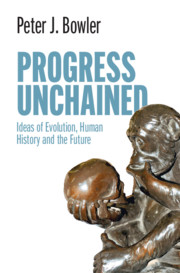Book contents
- Progress Unchained
- Progress Unchained
- Copyright page
- Contents
- Figures
- Preface
- 1 Introduction
- Part I The Ladder of Progress and the End of History
- Part II Towards a World of Unlimited Possibilities
- 7 Darwinian Visions
- 8 The Uniqueness of Humans
- 9 Branching Out
- 10 Towards an Uncertain Future
- 11 Epilogue
- Bibliography
- Index
8 - The Uniqueness of Humans
from Part II - Towards a World of Unlimited Possibilities
Published online by Cambridge University Press: 11 February 2021
- Progress Unchained
- Progress Unchained
- Copyright page
- Contents
- Figures
- Preface
- 1 Introduction
- Part I The Ladder of Progress and the End of History
- Part II Towards a World of Unlimited Possibilities
- 7 Darwinian Visions
- 8 The Uniqueness of Humans
- 9 Branching Out
- 10 Towards an Uncertain Future
- 11 Epilogue
- Bibliography
- Index
Summary
Applying the Darwinian perspective to human origins required palaeoanthropologists to abandon the assumption that the human race is the goal of the evolutionary process. Darwin himself suggested that our acquisition of higher mental powers was a by-product of an adaptive shift to walking upright. Although rejected for decades, this approach became widely accepted in the 1930s as fossil discoveries confirmed that bipedalism preceded the expansion of the brain and the plausibility of natural selection was boosted by the synthesis with genetics. Most of the biologists who pioneered the synthesis accepted that the human species could no longer be regarded as an inevitable outcome of evolution. Science-fiction authors began to explore the idea that there might be non-human aliens, recognizing that evolution could produce intelligent beings in many different ways.
- Type
- Chapter
- Information
- Progress UnchainedIdeas of Evolution, Human History and the Future, pp. 212 - 221Publisher: Cambridge University PressPrint publication year: 2021

